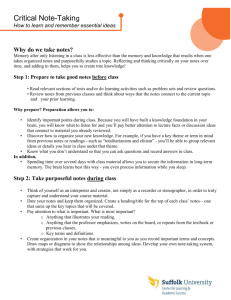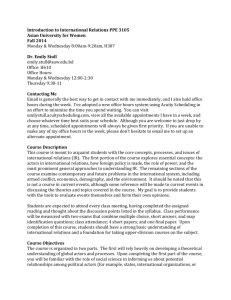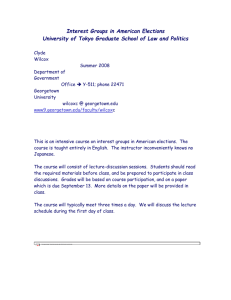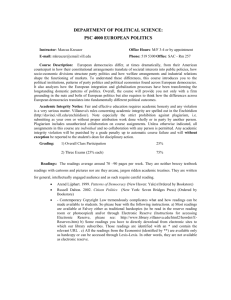AP US Government & Politics
advertisement
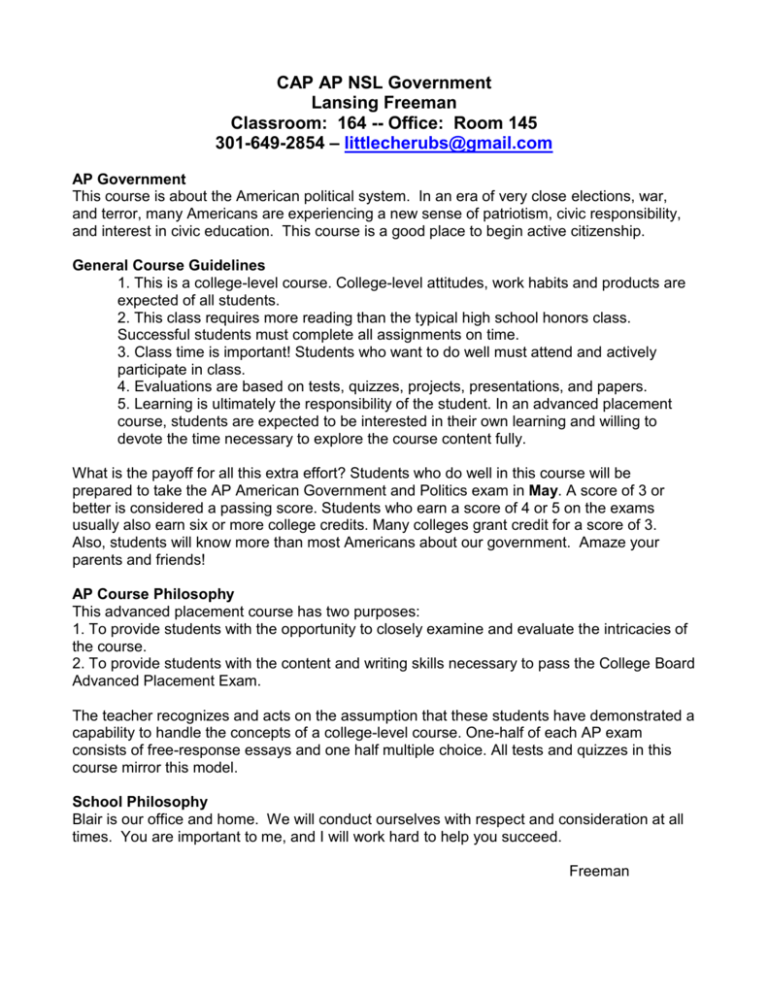
CAP AP NSL Government Lansing Freeman Classroom: 164 -- Office: Room 145 301-649-2854 – littlecherubs@gmail.com AP Government This course is about the American political system. In an era of very close elections, war, and terror, many Americans are experiencing a new sense of patriotism, civic responsibility, and interest in civic education. This course is a good place to begin active citizenship. General Course Guidelines 1. This is a college-level course. College-level attitudes, work habits and products are expected of all students. 2. This class requires more reading than the typical high school honors class. Successful students must complete all assignments on time. 3. Class time is important! Students who want to do well must attend and actively participate in class. 4. Evaluations are based on tests, quizzes, projects, presentations, and papers. 5. Learning is ultimately the responsibility of the student. In an advanced placement course, students are expected to be interested in their own learning and willing to devote the time necessary to explore the course content fully. What is the payoff for all this extra effort? Students who do well in this course will be prepared to take the AP American Government and Politics exam in May. A score of 3 or better is considered a passing score. Students who earn a score of 4 or 5 on the exams usually also earn six or more college credits. Many colleges grant credit for a score of 3. Also, students will know more than most Americans about our government. Amaze your parents and friends! AP Course Philosophy This advanced placement course has two purposes: 1. To provide students with the opportunity to closely examine and evaluate the intricacies of the course. 2. To provide students with the content and writing skills necessary to pass the College Board Advanced Placement Exam. The teacher recognizes and acts on the assumption that these students have demonstrated a capability to handle the concepts of a college-level course. One-half of each AP exam consists of free-response essays and one half multiple choice. All tests and quizzes in this course mirror this model. School Philosophy Blair is our office and home. We will conduct ourselves with respect and consideration at all times. You are important to me, and I will work hard to help you succeed. Freeman Readings: Wilson & DiIulio, American Government. The textbook will be used as a departure point for further reading and investigation. We will also be using a variety of supplementary readings and students will be expected to engage in research. Readings should be completed prior to class. In many cases, class time will be spent reviewing the readings. In other cases, we may not discuss the readings at all, except as they apply to other concepts or ideas. Typical to college courses, students are responsible for the content of the readings, whether they are discussed in class or not!!! It will be presumed that the readings have been completed, and, unless questions are raised, understood. Class time at least twice a week will be devoted to discussions on concepts covered in the textbook, seminars/discussion (student-centered) will fill the other day/days. Discussions and activities will center on ideas that are different from, critical or affirming of, or amplifying basic concepts. Partners and Study Groups Students are encouraged to select a partner for the course. The partner can provide the essential information (homework/classwork) that will be needed on the few occasions when you must be absent or do not understand. Study partners will assist when review for the AP exam in the spring. The partner idea should be expanded to the study group concept. Study groups are created to tap others’ insights and give mutual help in understanding readings and concepts. Study groups should plan to complete the assigned readings a day ahead of time so there will be time to discuss them before they are discussed in class. The group can raise questions that need to be raised in class as well as brainstorm answers. A study group’s purpose is not simply to divide up the workload, but to aid everyone in understanding the content of the course. If you find you are constantly giving and not receiving leave and join another group. A study partner will be chosen the first week of school. Study groups should plan to meet once a week around test time. Because there is more to read and less time to discuss readings in class, study groups are essential if students are going to participate fully (some class time will be provided). AP Examination The AP US Government and Politics exam is divided as follows: 45 minutes (50%): 60 multiple-choice questions 100 minutes (50%): 4 mandatory (no choices) free-response questions All students taking this course are encouraged to take the AP exam. All quizzes and tests in this course follow the format and language usage patterns found on the AP exams. Therefore, students will be comfortable dealing with the questions that will be on the exam. AP NSL – Course Overview I. Constitutional Underpinnings of US Government A. Considerations that influenced the formulation/adoption of the Constitution B. Separation of Powers C. Federalism D. Theories of democratic government II. Political Beliefs and Behaviors A. Beliefs that citizens hold about their government and leaders B. Processes by which citizens learn about politics C. The nature, sources, and consequences of public opinion D. The ways in which citizens vote and otherwise participate in political life E. Factors influencing citizens to differ terms of political beliefs and behaviors III. Political parties, interest groups, and mass media A. Political parties and elections 1. Functions 2. Organization 3. Development 4. Effects on the political process B. Interest groups, including political action committees (PAC’s) 1. The range of interests represented 2. The activities of interest groups 3. The effects of interest groups on the political process 4. The unique characteristics and roles of PAC's in the political process C. The mass media 1. The functions and structures of the media 2. The impacts of media on politics IV. Institutions of National Government: Congress, the presidency, the bureaucracy, and the federal courts A. The major formal and informal institutional arrangements of power B. Relationships among these four institutions, and varying balances of power C. Linkages between institutions and the following 1. Public opinion and voters 2. Interest groups 3. Political parties 4. The media 5. Subnational governments V. Public Policy A. Policy making in a federal system B. The formation of policy agendas C. The role of institutions in the enactment of policy D. The role of the bureaucracy and courts in policy implementation and interpretation E. Linkages between policy processes and the following 1. Political institutions and federalism 2. Political parties 3. Interest groups 4. Public opinion 5. Elections 6. Policy networks VI. Civil rights and civil liberties A. The development of civil liberties and civil rights by judicial interpretation B. Knowledge of substantive rights and liberties C. Impact of the 14th Amendment on the constitutional development of rights and liberties CAP NSL GOVERNMENT SYLLABUS 1st Quarter 10 50 5 10 10 10 5 3rd Quarter Homework 5 Chapter Questions 5 Change Project 3 Three Topics 2 Preferences Chapter Tests Declaration of Independence Debates Change Project Plan of Action Political Ideology Essays Presidential Election 10 50 10 10 10 10 Homework 5 Chapter Questions 5 Securities Project Chapter Tests Foreign Policy Analysis Foreign Policy Congress Economic Analysis Essay Change Project – Final Meeting 2nd Quarter 4th Quarter 10 50 5 10 10 10 10 Homework 5 Chapter Questions 5 Exam Review Chapter Tests Bill Narrative CAP Congress Candidate Analysis Change Project – 5 Business Letter 5 Mock Meeting Critical Thinking Essay 10 50 10 10 10 10 Homework 5 Chapter Questions 5 Exam Review Chapter Tests Liberty vs. Security Essay CAP Court Equal Opportunity Paper A Bomb






